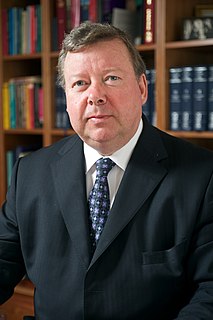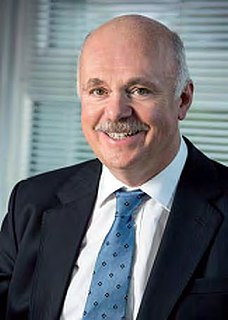Related Research Articles

The Court of Session is the supreme civil court of Scotland and constitutes part of the College of Justice; the supreme criminal court of Scotland is the High Court of Justiciary. The Court of Session sits in Parliament House in Edinburgh and is both a trial court and a court of appeal. Decisions of the court can be appealed to the Supreme Court of the United Kingdom, with the permission of either the Inner House or the Supreme Court. The Court of Session and the local sheriff courts of Scotland have concurrent jurisdiction for all cases with a monetary value in excess of £100,000; the plaintiff is given first choice of court. However, the majority of complex, important, or high value cases are brought in the Court of Session. Cases can be remitted to the Court of Session from the sheriff courts, including the Sheriff Personal Injury Court, at the request of the presiding sheriff. Legal aid, administered by the Scottish Legal Aid Board, is available to persons with little disposable income for cases in the Court of Session.

The High Court of Justiciary is the supreme criminal court in Scotland. The High Court is both a trial court and a court of appeal. As a trial court, the High Court sits on circuit at Parliament House or in the adjacent former Sheriff Court building in the Old Town in Edinburgh, or in dedicated buildings in Glasgow and Aberdeen. The High Court sometimes sits in various smaller towns in Scotland, where it uses the local sheriff court building. As an appeal court, the High Court sits only in Edinburgh. On one occasion the High Court of Justiciary sat outside Scotland, at Zeist in the Netherlands during the Pan Am Flight 103 bombing trial, as the Scottish Court in the Netherlands. At Zeist the High Court sat both as a trial court, and an appeal court for the initial appeal by Abdelbaset al-Megrahi.

William Douglas Cullen, Baron Cullen of Whitekirk, is a former senior member of the Scottish judiciary. He formerly served as Lord Justice General and Lord President of the Court of Session, and was an additional Lord of Appeal in the House of Lords prior to the transfer of its judicial functions to the Supreme Court.

The courts of Scotland are responsible for administration of justice in Scotland, under statutory, common law and equitable provisions within Scots law. The courts are presided over by the judiciary of Scotland, who are the various judicial office holders responsible for issuing judgments, ensuring fair trials, and deciding on sentencing. The Court of Session is the supreme civil court of Scotland, subject to appeals to the Supreme Court of the United Kingdom, and the High Court of Justiciary is the supreme criminal court, which is only subject to the authority of the Supreme Court of the United Kingdom on devolution issues and human rights compatibility issues.
John Alastair Cameron, Lord Abernethy is a Scottish lawyer, and a former Senator of the College of Justice, a judge of the country's Supreme Courts, serving from 1992 to 2007, when he retired. He was a member of the English Bar before moving to the Scottish Faculty of Advocates, where he served as vice-dean from 1983 to 1992.

Stephen Errol Woolman, Lord Woolman,, is a Scottish legal academic, and a Senator of the College of Justice, a judge of the country's Supreme Courts.
William Austin Nimmo Smith is a former Senator of the College of Justice, a judge of the Supreme Courts of Scotland, sitting in the High Court of Justiciary and the Inner House of the Court of Session. He retired from this position on 30 September 2009.
Derek Robert Alexander Emslie, Lord Kingarth KC is a judge of the Supreme Courts of Scotland, sitting in the High Court of Justiciary and the Inner House of the Court of Session. He is the son of former Lord President George Emslie, Baron Emslie, and younger brother of fellow judge Nigel Emslie, Lord Emslie.
John Francis Wheatley, Lord Wheatley, is a Scottish lawyer and retired Senator of the College of Justice, a judge of the Supreme Courts of Scotland, sitting in the High Court of Justiciary and the Inner House of the Court of Session. He is an authority on road traffic law. His father, John Wheatley, Baron Wheatley, was Lord Justice Clerk between 1972 and 1985, the second-most senior judge in Scotland.

Colin John MacLean Sutherland, Lord Carloway, is a Scottish advocate and judge who has served as the Lord President of the Court of Session and Lord Justice General since 2015. He was previously Lord Justice Clerk from 2012 to 2015 and has been a Senator of the College of Justice since 2000.
Matthew Gerard Clarke, Lord Clarke was a Senator of the College of Justice, a judge of the Supreme Courts of Scotland, sitting in the High Court of Justiciary and the Inner House of the Court of Session.

Paul Benedict Cullen, Lord Pentland, is a former Solicitor General for Scotland, a Senator of the College of Justice and former Chairman of the Scottish Law Commission.

Iain Bonomy, Lord Bonomy, is a former Senator of the College of Justice, a judge of the Supreme Courts of Scotland, sitting in the High Court of Justiciary and the Inner House of the Court of Session from 2010 to 2012. From 2004 to 2009, he was a Judge of the International Criminal Tribunal for the former Yugoslavia.
The Rt. Hon. Alexander Morrison Philip, Lord Philip, is a Scottish lawyer and former Senator of the College of Justice.

Duncan Adam Young Menzies, Lord Menzies, is a judge of the Supreme Courts of Scotland. He was appointed to the Outer House of the Court of Session in 2001, and the Inner House in 2012.
Roderick Francis Macdonald, Lord Uist is a Scottish retired judge. As a Senator of the College of Justice, he was a member of the Court of Session, Scotland's highest court.
Colin Malcolm Campbell, Lord Malcolm is a Scottish lawyer, and a Senator of the College of Justice, a judge of the country's Supreme Courts.
Colin Jack Tyre, Lord Tyre, is a Scottish lawyer, former President of the Council of Bars and Law Societies of Europe, and a Senator of the College of Justice, a judge of the Supreme Courts of Scotland.

Joseph Raymond Doherty, Lord Doherty, is a Scottish lawyer and Senator of the College of Justice, a judge of the Supreme Courts of Scotland.

The judiciary of Scotland are the judicial office holders who sit in the courts of Scotland and make decisions in both civil and criminal cases. Judges make sure that cases and verdicts are within the parameters set by Scots law, and they must hand down appropriate judgments and sentences. Judicial independence is guaranteed in law, with a legal duty on Scottish Ministers, the Lord Advocate and the Members of the Scottish Parliament to uphold judicial independence, and barring them from influencing the judges through any form of special access.
References
- ↑ "Top judge attacks 'blinkered' judicial appointments system". The Scotsman. 12 March 2008. Archived from the original on 3 December 2010. Retrieved 21 August 2009.
- 1 2 "Biographies - The Right Hon Lord Osborne". Scottish Court Service . Retrieved 21 August 2009.
- 1 2 "Privy Council Appointments". 10 Downing Street. 10 July 2001. Archived from the original on 9 September 2008. Retrieved 21 August 2009.